Why Spiders Invade UK Homes Every Autumn

- Why Spiders Invade UK Homes Every Autumn
- Understanding the Autumn Spider Surge
- Most Common Spiders Found in UK Homes in Autumn
- Signs That You Have a Spider Problem
- Why You’re Seeing More Spiders Now Than Ever Before
- How to Spider-Proof Your Home This Autumn
- Do You Need Professional Spider Control?
- What Our Spider Control Service Includes
- Bonus Tip: Avoid End-of-Tenancy Surprises
- Related Services You Might Need
- Frequently Asked Questions
- Final Word
Why Spiders Invade UK Homes Every Autumn
It’s late September and you’ve noticed more spiders than usual crawling across your carpet, clinging to the ceiling, or appearing in your bathtub. This is no coincidence. Every year, thousands of UK homeowners notice a sharp rise in spider activity around this time of year — and there are solid reasons why.
This long-form guide explores the science behind the seasonal spider surge, what attracts them to homes, how to keep them out, and what to do if things get out of control. We’ll also link to related services like Spider Control, Insect Control, and Domestic Pest Control for full support.
By understanding this annual behaviour, you can prepare your home properly, avoid unwanted encounters, and take back control of your space.
Understanding the Autumn Spider Surge
Spiders are Looking for Mates
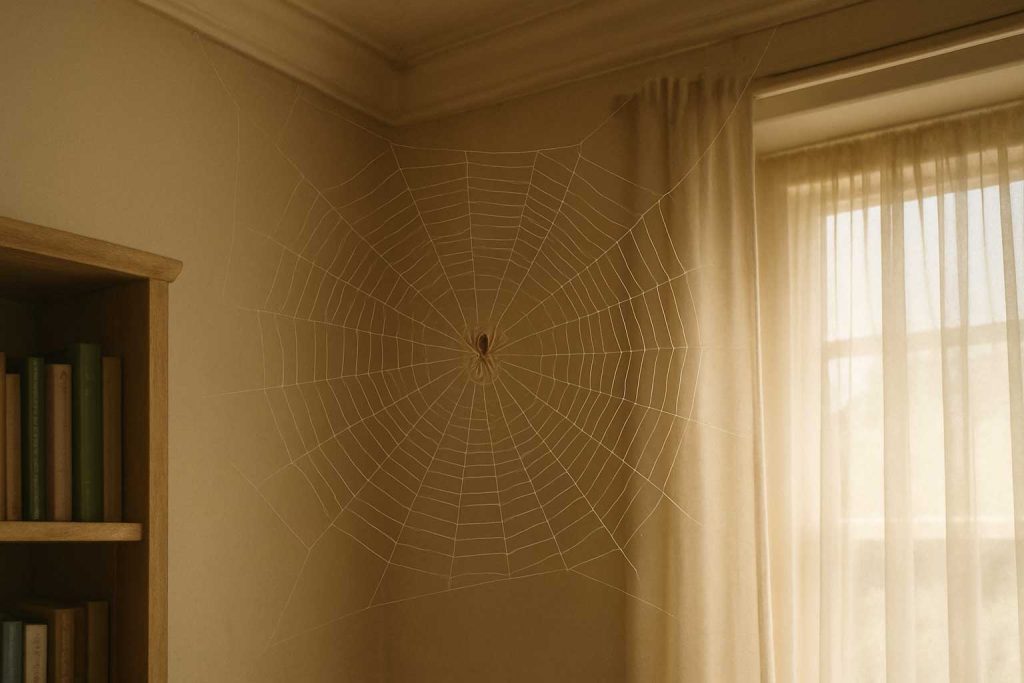
Most of the larger spiders that invade UK homes in September are males looking for a female to mate with. This is peak mating season for common species like the Giant House Spider (Eratigena atrica) and the Common House Spider (Tegenaria domestica).
Males are far more mobile than females, roaming from room to room — and house to house — in search of a mate. That’s why they’re suddenly appearing in your hallway, bathroom, or kitchen seemingly out of nowhere.
Colder Weather Drives Them Indoors
As outdoor temperatures begin to drop, spiders search for warmer and drier environments. Homes provide ideal conditions — steady warmth, shelter from rain and wind, and an abundance of hidden nooks to build webs and hide.
Indoor Homes Have More Food
Spiders are predators. If your home already has insects like flies, moths, mosquitoes, or ants, spiders will follow. This is especially common in older properties, homes near woodlands or water, and houses with poor window or door sealing.
For more on related insect issues, check out Insect Control.
Darker Days and More Lights
Spiders themselves aren’t attracted to light, but the insects they prey on are. As you turn on your lights earlier in autumn, flying insects gravitate toward windows and entry points — and spiders follow close behind.
Most Common Spiders Found in UK Homes in Autumn
Giant House Spider (Eratigena atrica)
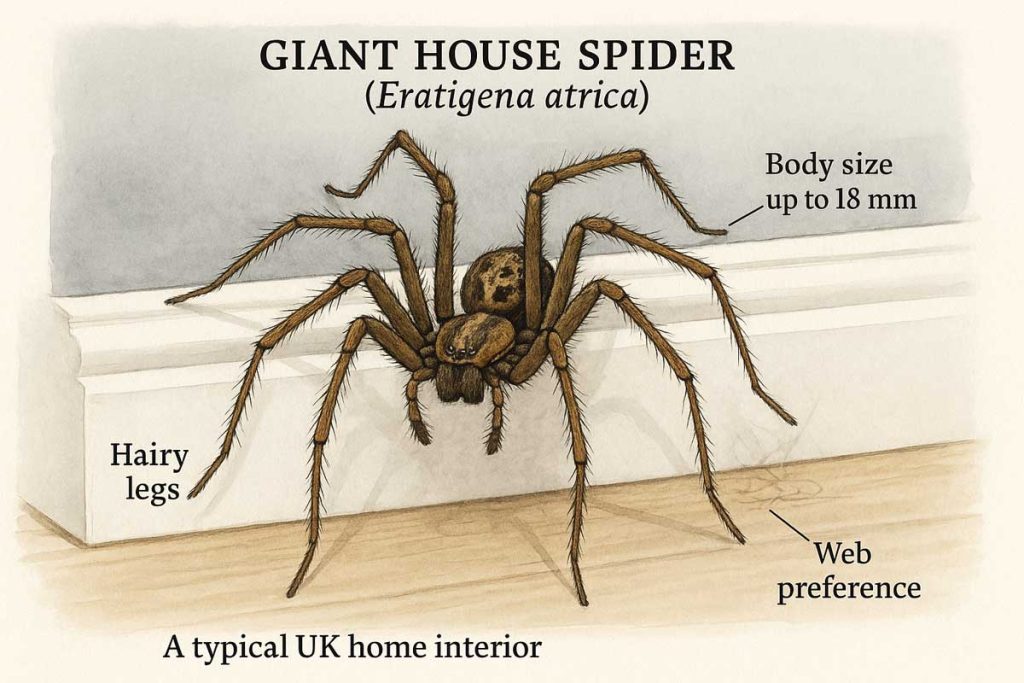
One of the most feared (and misunderstood) spiders in the UK. Despite their intimidating size — up to 12 cm leg span — they are completely harmless. Fast-moving males roam homes in autumn seeking females who remain in webs.
Common House Spider (Tegenaria domestica)
Builds funnel-shaped webs and prefers dark, undisturbed areas like lofts, behind wardrobes, or under furniture.
Daddy Long Legs / Cellar Spider (Pholcus phalangioides)
Often confused with harvestmen or crane flies, cellar spiders are extremely common indoors. Their long, thin legs help them navigate ceilings and upper corners.
False Widow Spider (Steatoda nobilis)
This species receives lots of media attention but rarely causes problems. Their bite is comparable to a wasp sting and bites are extremely rare. They prefer garages, sheds, and window frames.
Signs That You Have a Spider Problem
- Regular sightings of large spiders during evening hours
- Webs in corners, behind furniture, or around windows
- Spider egg sacs (small, white, cotton-like balls)
- Flies or small insects appearing indoors, indicating food sources
- Spiders in the bath or sink (they can’t climb out due to smooth surfaces)
One or two spiders are normal and even helpful. A full infestation or constant sightings indicate it’s time for prevention — or possibly professional help.
Why You’re Seeing More Spiders Now Than Ever Before
Some homeowners report that spider sightings have increased year after year. Here’s why that might be true:
- Climate change: Warmer and longer autumns extend the mating season
- Urban sprawl: Spiders adapt to urban environments easily
- Increased indoor lighting: More insects, more prey, more spiders
- Modern insulation: Keeps homes warm and perfect for overwintering
How to Spider-Proof Your Home This Autumn
Seal Entry Points
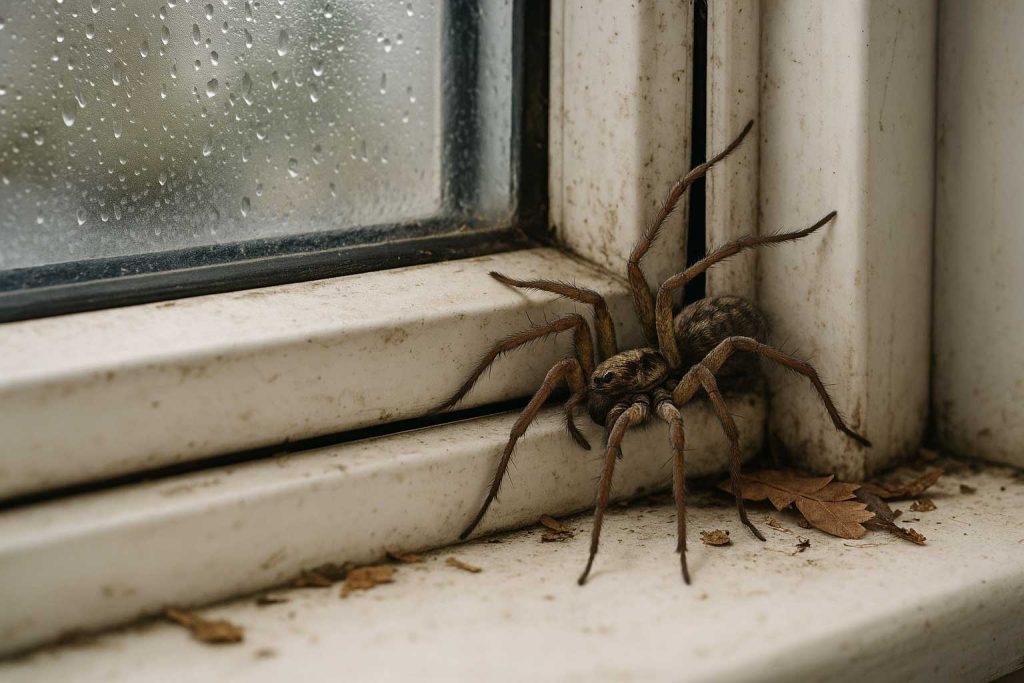
Spiders often enter through cracks, gaps, or poorly sealed areas. Pay attention to:
- Window and door frames
- Air bricks and ventilation grills
- Utility openings (pipes, cables, drains)
- Under door gaps (install brush strips)
These are the same points where insects also enter, so sealing them helps on multiple fronts.
Remove Shelter and Hiding Spots
- Declutter storage spaces, lofts, and basements
- Vacuum regularly under furniture and behind heavy appliances
- Don’t leave piles of laundry on the floor for extended periods
- Rotate stored clothing and cardboard boxes every season
Learn more seasonal pest tips on our Domestic Pest Control page.
Control Insects in the Home
If your home has a high fly or moth population, spiders will follow. Use fly screens, remove food waste quickly, and keep bins sealed. Consider reading:
How to Get Rid of Flies in the House
These guides can help reduce the prey that draws spiders in.
Regular Cleaning and Vacuuming
Vacuum ceilings, corners, skirting boards, and behind furniture. Remove both webs and egg sacs. Do not simply brush them away — use a vacuum to remove them entirely.
Natural Repellents
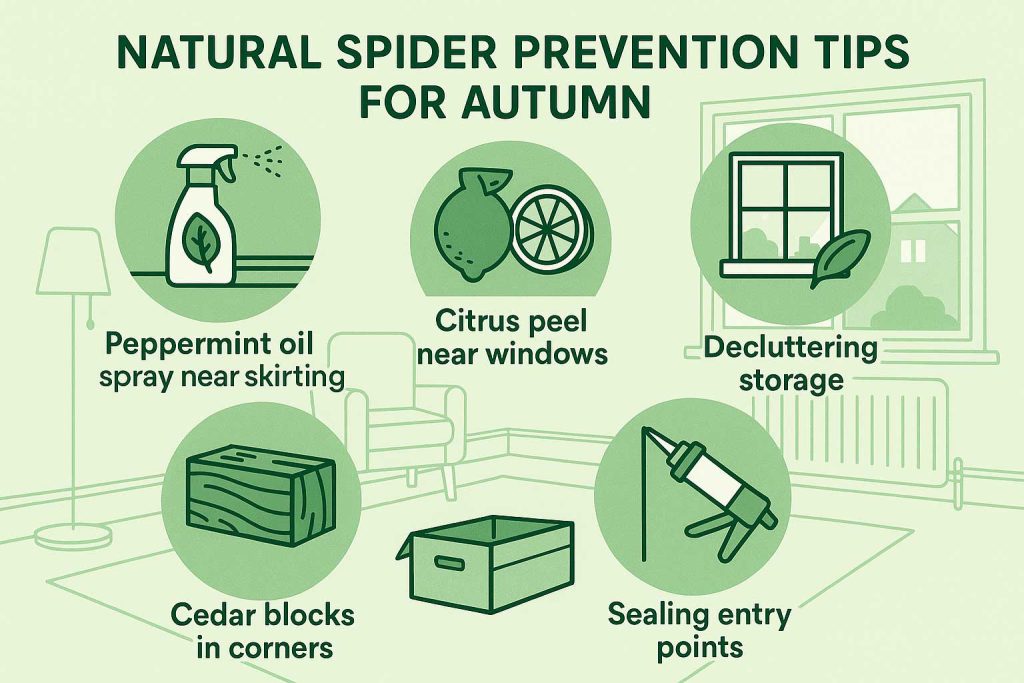
- Peppermint Oil: Mix 10 drops with water and spray around windows and door frames
- Citrus Peels: Place orange or lemon peels near spider-prone areas
- Cedarwood: Spiders dislike the scent — consider cedar furniture or essential oils
- Conkers: A traditional remedy placed on windowsills (effectiveness is debated)
Turn Off Outdoor Lights
Since lights attract flying insects (and insects attract spiders), turning off porch lights when not in use can help reduce activity around entry points.
Do You Need Professional Spider Control?
While occasional sightings are normal, professional help is recommended when:
- You’re seeing large spiders daily
- You find multiple egg sacs
- You suffer from arachnophobia or anxiety around spiders
- Children or elderly family members are scared or disturbed
- You operate a business, rental, or Airbnb property where guest comfort matters
At EradiControl, we offer safe, discreet, and effective spider treatments tailored to your home or business.
What Our Spider Control Service Includes
- Property inspection to identify harborage points
- Crack and crevice treatment with residual insecticide
- Removal of webs and egg sacs
- Professional advice on sealing and prevention
- Optional ongoing monitoring or seasonal return service
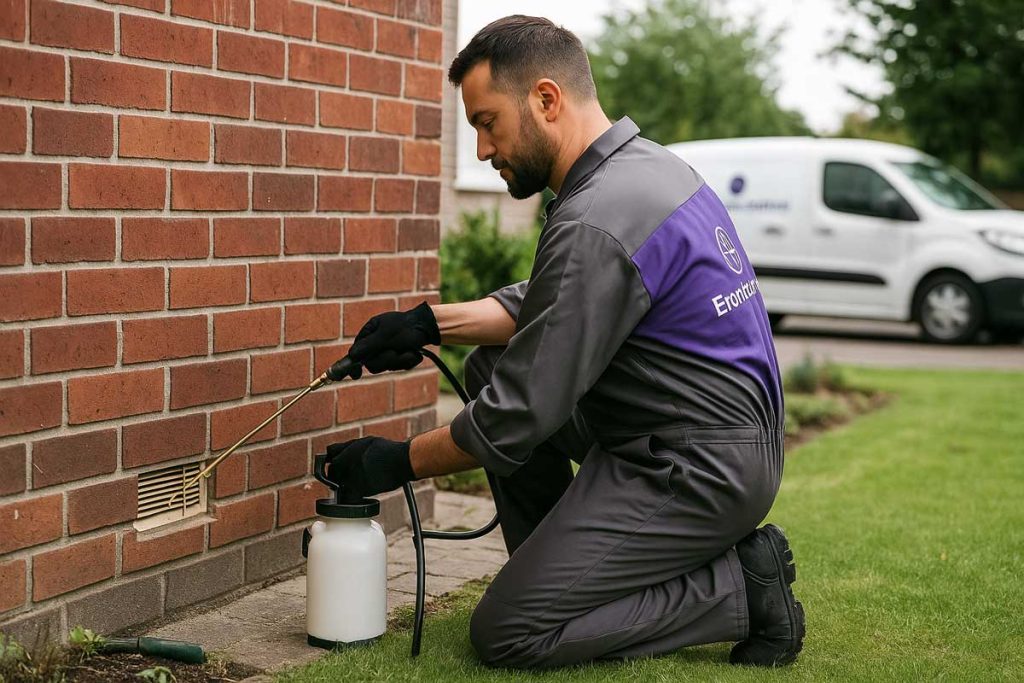
We serve all residential and commercial clients across:
Christchurch,
Bournemouth,
Poole,
Southampton,
and New Milton
Bonus Tip: Avoid End-of-Tenancy Surprises
If you’re a landlord or tenant, spider infestations can result in disputes. We offer thorough End of Tenancy Fumigation that includes spider control, ensuring peace of mind for all parties.
Related Services You Might Need
Frequently Asked Questions
Yes. Male spiders become active during mating season, peaking in September through October.
Spiders often fall into baths or sinks and cannot climb back out due to smooth surfaces. Bathrooms also have insects and moisture which attracts them.
UK house spiders are harmless. False widows can bite, but this is rare and usually mild. For most people, spiders are more of a nuisance than a health risk.
Yes. Use catch-and-release traps, seal entry points, and reduce their food sources. You can also hire eco-conscious pest control like EradiControl.
Anecdotally, yes — but it should be used alongside physical measures like sealing cracks and vacuuming webs. Alone, it won’t solve the issue.
Typically, up to 3 months depending on the environment. For long-term prevention, seasonal treatments are ideal.
Costs vary based on property size and severity. Contact us for a tailored quote:
Request a Quote
Final Word
Spiders in UK homes every autumn are part of nature — but that doesn’t mean you have to live with them. With smart prevention, regular cleaning, and help from trusted pest control professionals, you can enjoy a spider-free autumn.
Need support now? Visit our Spider Control page to get started.
Where to Next?
- Home
-
Domestic Pest Control
-
Commercial Pest Control
-
Eco-Friendly Pest Control
-
Emergency Pest Control
-
Rodent Control
-
Wasp Control
-
Bed Bug Treatment
-
Flea Control
-
Ant Control
-
Cockroach Control
-
Moth Control
-
Fly Control
-
Stored Product Insect Control
-
Spider Control
-
Carpet Beetle Treatment
-
Woodworm Treatment
-
Bird Control
-
Fox Control
-
Squirrel Control
-
Insect Control
-
Booklice Control
- Blog















Leave a Reply